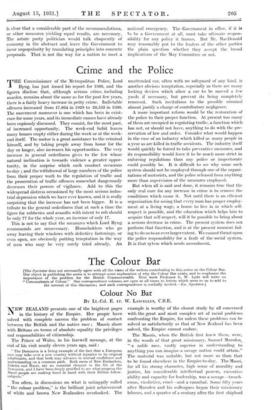Crime and the Police
THE Commissioner of the Metropolitan Police, Lord Byng, has just issued his report for 1930, and the figures disclose that, although serious crime, including murder, remains about the same as for the past few years, there is a fairly heavy increase in petty crime. Indictable offences increased from 17,664 in 1929 to 20,553 in 1930. The movement moreover is one which has been in exist- ence for some years, and its immediate causes have already been copiously discussed. They consist, for the most part, of increased opportunity. The week-end habit leaves many houses empty either during the week or at the week- end itself. The motor is a great assistance to the criminal himself, and by taking people away from home for the day or longer, also increases his opportunities. The very increase in general orderliness gives to the few whose natural inclination is towards violence a greater oppor- tunity, in the surprise which such conduct occasions to-day ; and the withdrawal of large numbers of the police from their proper work to the regulation of traffic and the prosecution of traffic offences somewhat dangerously decreases their powers of vigilance. Add to this the widespread distress occasioned by the most serious indus- trial depression which we have ever known, and it is really surprising that the increase has not been bigger. It is a tribute to the general orderliness that at such a time the figure for robberies and assaults with intent to rob should be only 77 for the whole year, an increase of only 17.
This is not to say that the measures which Lord Byng recommends are unnecessary. Householders who go away leaving their windows with defective fastenings, or even open, are obvimnly putting temptation in the way of men who may be very sorely tried already. An unattended car, often with no safeguard of any kind, is another obvious temptation, especially as there are many locking devices which allow a car to be moved a few yards if necessary, but prevent its being completely removed. Such invitations to the possible criminal almost justify a charge of contributory negligence.
A more important reform would be the restoration of the police to their proper function. At present too many of them are occupied in regulating traffic, a function which has not, or should not have, anything to do with the pre- servation of law and order. Consider what would happen in the case of an industry which killed as many people in a year as are killed in traffic accidents. The industry itself would quickly be forced to take preventive measures, and its responsibility would force it to be much more strict in enforcing regulations than any police or inspectorate could possibly be. It is difficult to see why some such system should not be employed through one of the organi- zations of motorists, and the police released from anything more than supervision of the measures employed.
But when all is said and done, it remains true that the only real cure for any increase in crime is to remove the conditions which cause it. Not until there is an efficient organization for seeing that every man has proper employ- ment at a living wage, a house to live in in which self- respect is possible, and the education which helps him to acquire that self-respect, will it be possible to bring about a serious decrease in crime. The present system does not perform that function, and is at the present moment fail- ing to do so to an ever larger extent. We cannot thrust upon the police responsibility for a fault of the social system. It is that sytem which needs amendment.






























 Previous page
Previous page